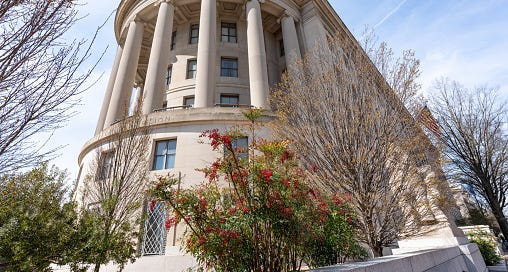Antitrust Law In The Biden Administration: What’s The Deal With That?
Vinson & Elkins partner Craig Seebald, a top antitrust litigator, analyzes last week's DOJ challenge to a $13 billion deal by UnitedHealth and the future of competition law.
Welcome to Original Jurisdiction, the latest legal publication by me, David Lat. You can learn more about Original Jurisdiction by reading its About page, you can reach me by email at davidlat@substack.com, and you can subscribe by clicking on the button below.
During Tuesday’s State of the Union address, President Joe Biden gave a few shout-outs to the legal community. He praised Justice Stephen Breyer—eliciting an adorable reaction from the justice, who was in attendance—and had warm words for Judge Ketanji Brown Jackson, the former Breyer clerk nominated to replace her former boss.
President Biden announced that the Justice Department will appoint a chief prosecutor for pandemic fraud, which is good news for the white-collar defense bar. And he also gave antitrust lawyers reason for optimism. In discussing his plans to tackle inflation, he noted that reduced competition leads to higher prices—and worse. In one of the evening’s most memorable lines, he declared, to significant applause from the audience, “Capitalism without competition is exploitation.”
The president’s remarks suggest an aggressive approach to antitrust enforcement—which we’re already seeing, one year into his administration. The most recent example: last week, the Department of Justice (“DOJ”) filed a lawsuit to block UnitedHealth Group’s proposed $13 billion acquisition of Change Healthcare. It’s only the latest of several cases filed by the Biden Administration to block transactions it views as anticompetitive.
It’s also noteworthy because unlike the typical deal the Justice Department or Federal Trade Commission (“FTC”) tries to stop, this one involves companies known for dominating somewhat different sectors. UnitedHealth owns UnitedHealthcare, the nation’s largest health insurer, while Change is the premier player in the related but distinct market of technology solutions used to process health-insurance claims.
What does the DOJ’s latest lawsuit say about the Biden Administration’s antitrust strategy? And what can we expect over the next three years from the DOJ and FTC in antitrust enforcement?
Earlier this week, I interviewed Craig Seebald, a veteran antitrust lawyer and partner at Vinson & Elkins, where he serves as co-head of the litigation and regulatory department and a leader of the global antitrust group. Here’s a (lightly edited and condensed) write-up of our conversation.
DL: Before we turn to the latest news, tell me about your own career as an antitrust lawyer and your practice at Vinson & Elkins.
CS: There are three major areas of antitrust practice: cartel, monopolization, and merger work. These flow from our three main statutes: Section 1 of the Sherman Act, which prohibits cartels; Section 2 of the Sherman Act, which prohibits monopolization; and Section 7 of the Clayton Act, which prohibits anticompetitive mergers and acquisitions.
It’s typical for lawyers to focus on one of these areas. I’m a bit unusual in that I’ve worked in all three over the years. I started my career in the D.C. office of what was then Pillsbury Madison & Sutro and spent my first 15 years defending mergers, an active area at the time.
Then in the late 1990s and early 2000s, when regulators in the U.S. and Europe and Canada turned to rooting out global cartels, I started doing cartel work. Defending multinational companies in cartel and price-fixing investigations and follow-on civil litigation now represents about 75 to 80 of my practice here at Vinson & Elkins, although I still do some merger work as well.
DL: Who are some of V&E’s antitrust clients?
CS: We’re a leading law firm in the energy space, so many of our clients come from the energy sector. Google is a major antitrust client of ours. I currently represent a large Chinese chemical company in a grand jury investigation and follow-on litigation in the Western District of Pennsylvania. Most of my work is on the defense side, but I do some plaintiff-side work. For example, right now I’m representing twelve of the largest shippers against the four major railroads in litigation over fuel surcharges.
DL: Turning to the latest news, can you explain the lawsuit the Justice Department filed against UnitedHealth and Change last week?
CS: The DOJ has two main concerns about UnitedHealth’s proposed acquisition of Change. First, Change has a huge amount of data and competitively sensitive information about UnitedHealth’s competitors in the health-insurance business, who use Change and its electronic data interchange (“EDI”) clearinghouse for processing their claims. The DOJ fears that United would be able to use this information to obtain an unfair advantage over its rivals, harming competition in the market for health insurance.
Second, one of UnitedHealth’s subsidiaries, OptumInsight, has its own claims-processing and EDI business, and this deal would eliminate that subsidiary’s only major rival for what’s called “first-pass claims editing technology.” According to the DOJ’s complaint, Change has 50 percent and OptumInsight has 25 percent of this market, so together they would have 75 percent—a monopoly share.
DL: Couldn’t these issues be addressed through firewalls, which could insulate UnitedHealth’s health-insurance business from its health-tech/EDI business, or divestitures, which could lower market share?
CS: Firewalls and divestitures have been used in in the past. And here, UnitedHealth and Change said in their merger agreement that they’d be willing to divest assets accounting for up to $650 million in annual revenue to get the deal approved. But this lawsuit may signal that, going forward, the DOJ and FTC will be more inclined to litigate rather than settle. Instead of trying to get concessions from the parties, they might simply say, “No, we’re just not going to let this deal go through.”
DL: What else does this lawsuit say about the Biden Administration’s antitrust strategy?
CS: This lawsuit reflects a few trends. First, we’re seeing an unprecedented number of merger challenges. Usually you might have one to two court cases in a given year. But in the past year we’ve had multiple court cases, including a challenge to the Lockheed/Aerojet deal, which was terminated, and litigation over the Penguin Random House/Simon & Schuster deal, which is still pending.
Second, it suggests that the Biden Administration believes regulators need to take a more holistic view in evaluating deals. It was interesting to see the DOJ refer to UnitedHealth as a “serial acquirer” of businesses. In the past, regulators might allow a company to buy one little business here, one little business there—and the next thing you know, the company has done 35 acquisitions, as UnitedHealth has done in the past decade. It looks like the Biden Administration is saying that regulators need to take a step back and look at what a company has been doing over the longer term, not just on a deal-by-deal basis.
DL: Looking ahead, what do you predict we’ll see over the next few years in antitrust enforcement?
CS: For the first time in a long time, we might actually see new antitrust legislation. There are a number of antitrust bills being considered by Congress, especially relating to the tech sector and the regulation of major platforms like Google and eBay. There are some bills that would adjust the standards for challenging mergers. There’s a bill that would narrow the antitrust exemption for the shipping industry. I think Biden would sign any of these if passed.
It used to be that Democrats would be very aggressive on antitrust, and Chamber-of-Commerce-type Republicans would oppose antitrust legislation and regulation. But now we’re seeing Republicans becoming more populist—and more focused on antitrust. Josh Hawley has an antitrust-reform bill that’s not all that different from Amy Klobuchar’s. Lina Khan, a fairly progressive regulator, got almost 70 votes when confirmed to the FTC—including the vote of Roger Wicker, a conservative senator from Mississippi.
Gallup conducted a very interesting poll last year, which showed that Republicans’ net confidence in both big business and big tech is now negative. A year earlier, it had been positive. This explains why we’re now seeing this convergence between the right and the left on antitrust.
On the regulatory side, we’ll continue to see more challenges to deals, which is causing deals to take longer. We’ll continue to see more investigations of dominant companies, as well as more monopolization cases. On the cartel side, things have been slower—cartel cases take longer to put together, with investigations and presentations to grand juries—but we’re expecting things to pick up here too.
DL: Turning to the practice of antitrust law, how would you describe the outlook for antitrust, in both the short and long term? If a law student or young lawyer asked you whether you’d recommend this field, what would you say?
CS: Antitrust lawyers are going to be very busy over the next few years. And I don’t expect that to change even if Republicans retake the White House. I heard horror stories about how slow things were for antitrust lawyers during the Reagan Administration, but throughout my career—I graduated law school in 1992—I’ve seen only marginal differences between administrations.
I definitely recommend antitrust work to law students and young lawyers. It’s intellectually stimulating. You’re constantly learning about different industries, everything from chemicals to missiles to railroads, which makes things fun. The cases—challenges to major mergers, prosecutions of senior executives under the cartel laws—are often very important to the companies.
You’re involved in cases that are in the Wall Street Journal, things that people want to talk about. Last year, the Supreme Court decided the big NCAA case, which everyone wanted to talk about. As an antitrust lawyer, you’re in the middle of it all. It’s great.
DL: I can tell from our conversation that you love what you do, Craig. Thanks so much for your time and insight!
Thanks for reading Original Jurisdiction, and thanks to my paid subscribers for making this publication possible. Subscribers get access to Judicial Notice, my time-saving weekly roundup of the most notable news in the legal world, as well as the ability to comment on posts. You can reach me by email at davidlat@substack.com with any questions or comments about Original Jurisdiction, and you can share this post or subscribe using the buttons below.






Posting on behalf of a reader who emailed me (as some readers prefer to do, instead of posting under their own names:
"My question would be is there any consensus in Congress or in reform minds that we should change the 'consumer welfare' standard that more or less governs antitrust. Isn’t there still fealty to that standard among judges? If that is to be replaced or amended, then 'to what'?"
"I think reformers have been hesitant to define a new standard with any precision, and that risks a certain amount of intellectual incoherence. Until Congress acts. I haven’t looked at the proposed bills; I’m sure they all use words that give judges some leeway in interpreting how to apply them. But what’s the lodestar of the new approach?"
Great story, David!